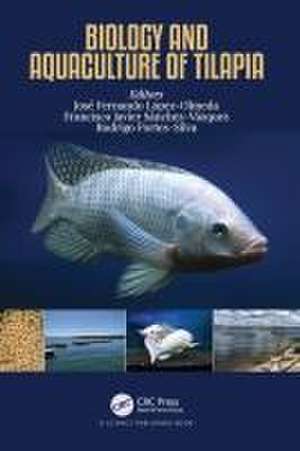Biology and Aquaculture of Tilapia
Editat de José Fernando López-Olmeda, Francisco Javier Sánchez-Vázquez, Rodrigo Fortes-Silvaen Limba Engleză Paperback – 29 ian 2024
| Toate formatele și edițiile | Preț | Express |
|---|---|---|
| Paperback (1) | 493.98 lei 3-5 săpt. | +18.99 lei 6-12 zile |
| CRC Press – 29 ian 2024 | 493.98 lei 3-5 săpt. | +18.99 lei 6-12 zile |
| Hardback (1) | 1115.33 lei 6-8 săpt. | |
| CRC Press – 11 noi 2021 | 1115.33 lei 6-8 săpt. |
Preț: 493.98 lei
Preț vechi: 536.94 lei
-8% Nou
Puncte Express: 741
Preț estimativ în valută:
94.52€ • 99.22$ • 78.46£
94.52€ • 99.22$ • 78.46£
Carte disponibilă
Livrare economică 20 martie-03 aprilie
Livrare express 05-11 martie pentru 28.98 lei
Preluare comenzi: 021 569.72.76
Specificații
ISBN-13: 9781032125336
ISBN-10: 1032125330
Pagini: 324
Ilustrații: 76
Dimensiuni: 156 x 234 x 19 mm
Greutate: 0.4 kg
Ediția:1
Editura: CRC Press
Colecția CRC Press
ISBN-10: 1032125330
Pagini: 324
Ilustrații: 76
Dimensiuni: 156 x 234 x 19 mm
Greutate: 0.4 kg
Ediția:1
Editura: CRC Press
Colecția CRC Press
Cuprins
1. Tilapia Genetic Resources: Conservation and Use for Aquaculture 2. Selective Breeding of Farmed Tilapia 3. Structure and Physiology of the Gastrointestinal Tract 4. Current Improvements in Tilapia Nutrition 5. Feeding Practices and Their Determinants in Tilapia 6. Osmoregulation in Tilapia: Environmental Factors and Internal Mechanisms 7. Pathologies in Farmed Tilapia and the Use of Immunostimulants and Vaccines to Prevent or Treat Diseases: An Overview 8. Sex Determination and Differentiation of Tilapia 9. Reproductive Physiology of Tilapia 10. Embryonic and Larval Development of Tilapias 11. Tilapia Larviculture 12. Biological Rhythms in Tilapia 13. Tilapia Production in Aquaponics 14. Biofloc Technology (BFT) in Tilapia Culture 15. Tilapia Processing - Relevant Aspects Pointing to Promising Horizons
Notă biografică
José Fernando López-Olmeda, PhD in Biology (2009), is a senior researcher at the Department of Physiology of the University of Murcia (Spain). His research line is focused on fish circadian biology and the role of biological clocks in the stress response, metabolism, reproduction and behavior. He has expertise on a broad number of fish species such as tilapia, zebrafish, medaka, goldfish, tench, sole, sea bass and gilthead sea bream.
Francisco Javier Sánchez-Vázquez, PhD in Biology (1995), is full Professor of Physiology at the University of Murcia, Faculty of Biology (Campus Espinardo, Murcia, Spain). He is the head of the "Fish Chronobiology" group and has broad expertise on fish feeding and reproduction rhythms. His research activity is focused on fish species with interest in aquaculture, such as sea bass, sea bream, Senegalese sole and tilapia as well as basic models such as zebrafish.
Rodrigo Fortes-Silva, PhD in Animal Science (2005), is full Professor of Aquaculture at the Federal University of Viçosa, Faculty of Animal Science, Brazil. Fortes-Silva does research in fish nutrition and Aquaculture with relevancy on feeding behavior of tropical fish as tilapia, tambaqui and Arapaimas gigas.
Francisco Javier Sánchez-Vázquez, PhD in Biology (1995), is full Professor of Physiology at the University of Murcia, Faculty of Biology (Campus Espinardo, Murcia, Spain). He is the head of the "Fish Chronobiology" group and has broad expertise on fish feeding and reproduction rhythms. His research activity is focused on fish species with interest in aquaculture, such as sea bass, sea bream, Senegalese sole and tilapia as well as basic models such as zebrafish.
Rodrigo Fortes-Silva, PhD in Animal Science (2005), is full Professor of Aquaculture at the Federal University of Viçosa, Faculty of Animal Science, Brazil. Fortes-Silva does research in fish nutrition and Aquaculture with relevancy on feeding behavior of tropical fish as tilapia, tambaqui and Arapaimas gigas.
Descriere
This book reviews up-to-date knowledge on the biology and aquaculture of tilapia, with special focus on the Nile tilapia (Oreochromis niloticus). Tilapia are a group of fish species that have become one of the most cultured worldwide, currently having a big economic impact on both developed and developing countries.
